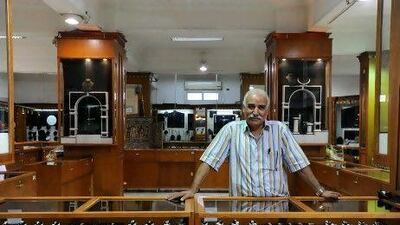CAIRO // Adel El Sarawy hopes his small business will blossom again after the Arab Spring rocked Egyptian society.
In the past few months, sales have started to pick up at his jewellery stand at Merit Center El Bazar in Giza.
Business at the market, which includes stands that sell statuettes, papyrus-based art and other handmade works, is now up about 25 per cent from eight months ago, when protests erupted in Tahrir Square then swept across Egypt.
But, as for many small and medium-sized enterprises (SMEs) operating then, business at Merit Bazar ground to a halt.
Many shops closed their doors temporarily when demand from customers dried up.
"After the revolution we were completely dead," says Mr El Sarawy, a senior salesman at Merit Bazar. "It's getting better. We're still surviving."
It would be an understatement to say the smooth running of Egypt's economic engine depends on how well its small to medium businesses fare.
While SMEs represent at least 95 per cent of all private companies in the Middle East and North Africa, they make up 99 per cent of those outside of the agricultural industry in Egypt, according to a report released in May by a UN commission.
Today, SMEs are regarded as the major weapon in easing the country's high unemployment rate, which hovers at 11.8 per cent.
According to the UN report, SMEs are responsible for three quarters of all jobs created in Egypt.
Many small business owners are still waiting to hire staff and some have complained that it has been hard to seek government assistance or even get started with a new venture due to difficulties in obtaining the right kind of business licence.
Part of this, experts say, is due to the transitional state of the government, as parliamentary elections are not slated to begin until next month.
Even so, some SMEs are changing their approach to conducting business to try to boost revenue.
In the technology sphere, new start-ups as well as more established SMEs are revisiting an idea that failed to pick up in the region in the mid-1990s - providing services online and fuelling business through internet-based payments.
"After the revolution, all of a sudden the number of internet users jumped dramatically, especially among the youth in Egypt," says Khaled Ismail, the board chairman at Endeavor Egypt, an organisation that mentors entrepreneurs with small businesses. "I'm seeing a lot of businesses starting to offer their services online."
One of the companies involved with Endeavor Egypt, e-masary.com, has been capitalising on this trend by offering Web-based services that include online methods for topping up mobile phones or electronic payment cards.
More traditional SME owners, such as furniture and retail companies, who work from the narrow backstreets of Old Cairo, are also more focused on selling their wares abroad.
These days, some are willing to sell handmade goods at lower prices to compete against other global artisans.
"I'm seeing a lot of them willing to drop their margins," says Mr Ismail. "They have become more competitive in the Arab world."
There has certainly been plenty of motivation for SMEs to seek new markets for their products this year.
In April, more than half of small and medium-sized businesses said they saw a major drop in sales due largely to economic turmoil, according to a joint survey from the GfK Group, a market research company, and Business Today magazine in Egypt.
By last month, many business owners had seen the landscape improve and only 6.5 per cent had reported a strong drop in sales.
But SMEs in the tourism industry have been especially hard-hit since the revolution. They are expected to earn about US$10 billion (Dh36.72bn) in revenues this year from visitors, which is down 25 per cent from last year, the Egyptian minister of tourism reported.
In Luxor, visitors used to pour in to Mara House, a boutique hotel that features eight suites and operates like a bed and breakfast. In spite of its small size, it is ranked the second-best hotel in Luxor on the travel site TripAdvisor.
Last year, Mara House was almost fully booked.
But with the exception of April this year, few tourists have been spending their nights there. The hotel has been trying to compete with discounts offered from big-brand hotels.
"Lowering my price from what it was means I am running below cost," says Marie Vaughan, who runs Mara House and had to lay off some of her staff earlier this year. "I can survive another year, I think, with just a dribble of tourists.
"Some businesses will never recover and reopen."
Still, Ms Vaughan sees signs of hope as the weather and once fiery political climate begins to cool. She has a scattering of bookings later this month and next.
Other small players in the tourism industry are also seeing signs of a turnaround.
Eman Fawzy Ahmed has worked as a freelance tour guide for 12 years, linking up with different travel agencies and tour operators.
Before the revolution, she was shuttling tourists around sites such as the Great Pyramid of Giza five times a week.
While Ms Ahmed has recently been averaging just one tour a week, she remains cautiously optimistic about the winter months and could even hire her own staff if business grows beyond its peak in the past.
"I think it'll be better," she says, "because most of my travel agents say next month is better than the last few."

